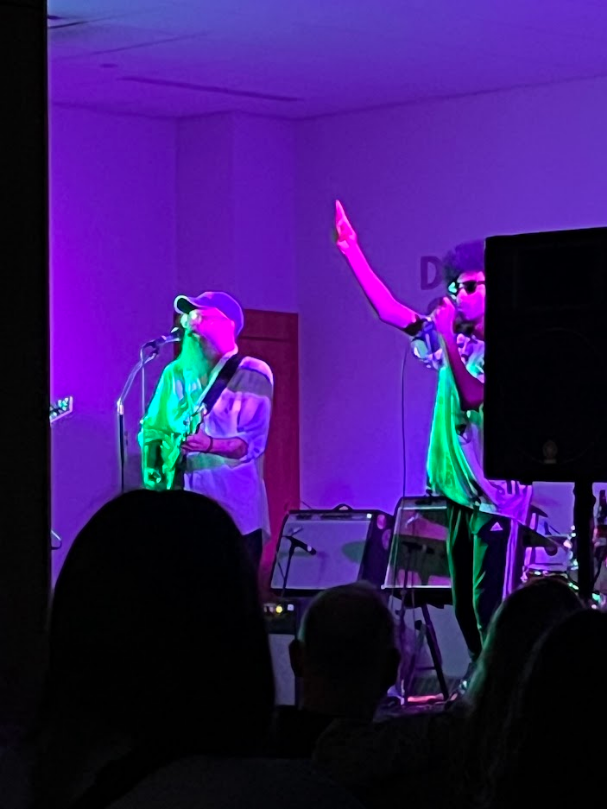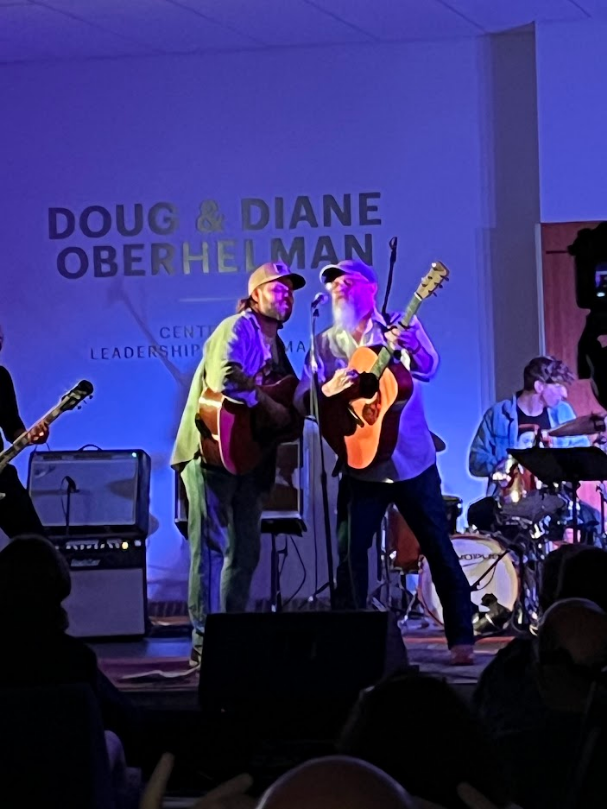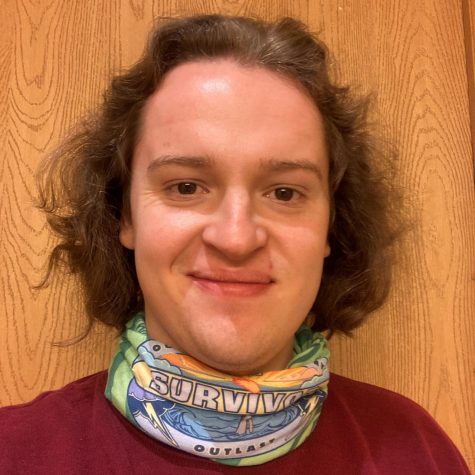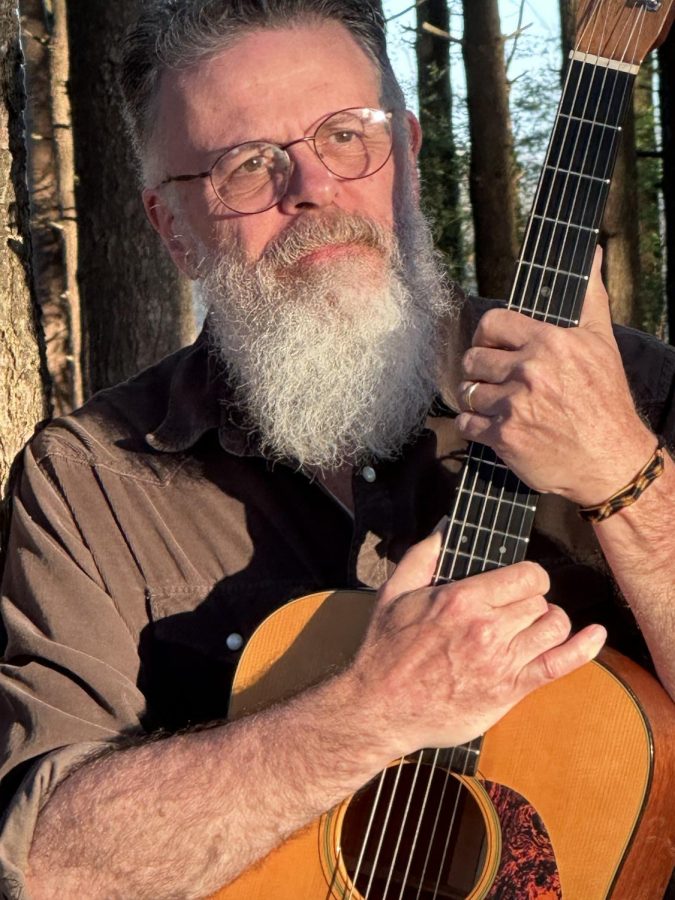Dr. Dave: The Next Chapter
At the end of the school year, Millikin will say farewell to Dr. David Burdick, one of the most beloved professors on campus.
Dr. Dave, as he is affectionately known, has been teaching at Millikin since 1989, first as a composition professor and now as chair of the music industry studies department.
“I called and I said ‘hey,’” Dr. Dave said. “I introduced myself on the phone. I said, ‘I was informed that there was a job opening for composition,’ and [the secretary] said, ‘Oh, I’m sorry, we closed applications two days ago for that.’ And I just said, ‘Okay! Thanks!’ And I hung up.”
Fortunately, Dr. Stephen Widenhofer, professor and former director of the School of Music, called Dr. Dave at home and asked him to apply for the position.
“It turns out that the guy who was here, and was leaving — thus creating the job opening — was none other than my old friend, Don Chamberlain,” Dr. Dave said. “We went to Berklee College of Music together in the late seventies/early eighties, we both ended up at University of Texas in the mid-eighties, we both played in the same band — I played a couple of guitarists later, after he had left — and we still had never met. Don probably told Steve, ‘If you like my profile on this job, Dave Burdick is exactly the same thing.’ Which is true, but not true, of course — I’m not the same guy — but I had the same credentials.”
Dave was pleasantly surprised when he was offered the position, given its competitive nature.
“There were, I think they told me, 73 people applied for this job,” Dr. Dave said “And I got it. And I knew who some of the other people were fabulous musicians, better musicians than I am. But I was the right fit. And I didn’t know what that meant, I was like ‘Really? A composition teacher? How much does the fit really matter?’ Well, they had other plans for me, as it turns out.”
Those plans included a total overhaul of the commercial music and music business programs, integrating aspects of the changing landscape of the industry.
“Doc Widenhofer was a very progressive educator, and he was running commercial music,” Dave said. “And we realized, when I came in, that he had some young blood here. And he knew that I was on top of a lot of things in commercial music, just because, right up until I came here, that was what I was doing…And he just turned me loose on the curriculum. I would just go to him and say, ‘Doc…we don’t have a songwriting curriculum.’ And I explained to him why I thought we should, and Doc was like, ‘Yeah! Excellent! Make it happen.’ And that was the story!”
Dr. Dave ended up creating dozens of new courses, expanding the program beyond the scope of jazz and classical music.
“In my opinion, he is the degree,” Will Long, a senior commercial music major, said. “There would be no music industry studies without him, no commercial music without him. He does it and he does it very well.”
Eventually, Dr. Widenhofer, after becoming director of the School of Music, offered Dr. Dave the position of chair of Music Industry Studies.
“I freaked!” Dr. Dave said. “I just thought, ‘That’s not me! I’m not this, I’m not that.’ He goes, ‘Oh, come on. You’ve really been doing it. It’s just, now you’ll be the one.’ And so, he mentored me for a year, where he kind of co-directed with me.”
After over 20 years in the position, it’s clear that Dr. Widenhofer’s intuition was correct. Dr. Dave has become an icon of the School of Music, inspiring students with his down-to-earth attitude and long-winded stories.

“I’ve had Dr. Dave a few times,” Charles Quigless, a junior commercial music major, said. “He’s also my advisor. Very chill dude, I’ve enjoyed my time with him. We even worked together a few times; I know we’ve been working together a lot recently. Plus I really enjoy hearing about his wisdom, too.”
During the 33 years he’s spent at Millikin, Dr. Dave has been offered several opportunities at other institutions — some of which offered more than twice what Millikin paid — but what ultimately kept him in Decatur was the freedom he was given to experiment with the curriculum.
“At Millikin, I have taught at least 55 different courses on this college campus in the years I’ve been here,” Dr. Dave said. “More than half of them I designed myself…So I didn’t take any of those jobs, and I stayed at Millikin, frankly, because I got to map out my whole vision here as a curriculum and see if it worked and see if it didn’t, and fix what didn’t work and enhance what did work, and be surrounded by students who, I thought, were more intelligent — on average — than the other places that I had job opportunities. So turns out it wasn’t bullshit: I was actually motivated by the right thing.”
Eventually, however, a combination of the COVID-19 pandemic and the sheer workload began to take its toll.
“I always said that if I wasn’t gonna be all-in, I’m doing the students a disservice and it’s time to get out,” Dr. Dave said. “And I started feeling like I wasn’t all-in. And so last year, during the summer, I was just thinking…And I remember the moment I wrote that letter…It was one sentence: ‘This letter is to officially inform you that I will be retiring at the end of the 2022-2023 school year. Sincerely, Dr. Dave.’ That was my retirement letter. I went to the three offices, I dropped that letter down, and I felt like a new man. I felt reborn! I knew I had made the right decision; I haven’t second-guessed it for a heartbeat. It was time. And I have plans.”
After leaving Millikin, Dr. Dave hopes to shift his focus to writing and performing music, while still supporting other musicians and giving them a platform. In particular, Dr. Dave cites his students for giving him the inspiration to put more attention into his own artistry.
“I had such a great songwriting class [last year],” Dr. Dave said. “In the past, I might have a class that had more focus on commercial success, in a way. This class was more focused on the artistry of it, in a way. And it really affected me. And I remember, vividly, going home for thanksgiving break and riding a high from that class…I was jazzed! So I started writing again, and I haven’t stopped. And I credit that class for giving me the last kick in the ass I needed to go back to writing Which I’ve always done: since I first learned three chords on the guitar, I started writing. But now, I had the benefit of having been my own student.”
Dr. Dave also hopes to continue “serving” in some capacity, even if it’s not in a classroom.
“I came up with a show called the Songwriters’ Basement Sessions,” Dr. Dave said. “The Songwriters’ Basement Sessions is where I make use of all of my connections to all the regional players I’ve played with, who are beautiful, wonderful players. And I’ve recorded with anyone on that list. I know they can function in a studio. And I know all these songwriters! And I want to bring them in, and we’re gonna do a show, and the show will start with the demo of the song, show a little bit of the process, and finish with a live production of their songs, with all these great players I have.
“And that made me realize I need an offshoot show, called Songcraft with Dr. Dave, which is so I can just keep teaching songwriting — as if it can be taught, right? And that is just gonna be an examination of songcraft using other people’s songs as examples. And then viewer feedback, of course, will be very important for that, so that there’s buy-in.
“And then that, in turn, led to a third show, which is just going to be called Songwriters’ Roundtable. And I will only do that every now and then, and that’s where I invite a couple of songwriters onto my show, and we talk songcraft, but they talk in regards to their own writing as opposed to me speaking more generically about songcraft.”
In the aftermath of the pandemic, enrollment dropped 8% from 2019 to 2022, according to the National Student Clearinghouse. With Millikin declaring financial stringency, the future of departments like music industry studies remains uncertain.
“I’m concerned about Millikin,” Dr. Dave said. “I am devastated that music got hit as hard as it did. The university, there’s a few things they didn’t understand, which is: every music department in the country got slaughtered in the pandemic…The School of Music, one thing we are connected to is public educators in music. We knew it was turning around, but the inertia was slow. It was gonna take time for us to rebuild. And instead, the university was deaf to that, in my opinion, and just decided to look at current trend lines from the last two years after the pandemic, and whittle us down horribly…That bothers me a lot, because this school is known nationally for theatre and music. That’s what we do.”

Whatever the case may be, though, Dr. Dave will continue creating art and fostering talent whenever he can. And in a time where the U.S. seems more divided than ever, he will always strive to bring people together through music.
“Let’s face it: this is America,” Dr. Dave said. “We’re still born into a racist, judgmental cage in this country. We’re getting a lot better about it because we’re finally talking about it and doing something about it, but we ain’t there yet, we know that. But art has always been the thing that opens that pathway, because it goes to your heart and your own experiences, and you realize the thing that you share, not the things that divide you. And I want to remain committed to that in any way I can, right here in Decatur.”
____________________________________
Click here to watch my interview with Dr. Dave and junior Priscilla Sabourin about the Millikin Songwriters’ Band.

Mason Hoyt is a senior Commercial Music major with a Theatre minor. They are the 2022-2023 Arts Editor for the Decaturian. Mason won Best Column at the...

